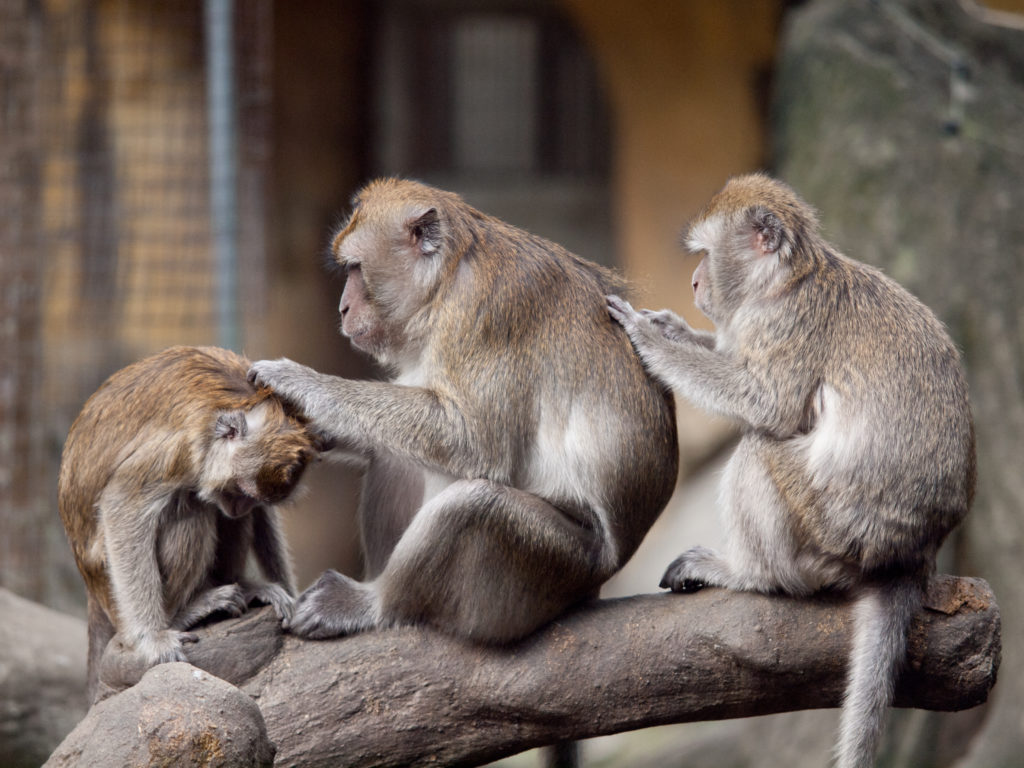
The headline is a bit “click baity” but it is what a group of researchers found. To be more specific they found in macaques (cute monkeys) in the wild that having more grooming partners grew different regions of the brain. Grooming is the primate version of having a heart-to-heart with a friend, or cuddle with your family or romantic partner.
What is interesting in this research is that it tracked this over time and hence also the growth and development of brain regions over time. Previously we have only been able to associate regions of the brain in animal models and human beings that correlate with sociality.
This is all good and well but it doesn’t give us an indication of causation, a chicken or egg problem: are those with enlarged social regions in the brain more social, or does socialising increase the size of these regions?
These researchers have shown for the first time that grooming, which is an intense form of socialising in macaques does actually grow these regions. And what do these regions do?
Well, the regions that grew were those that are specifically associated with social decision-making and empathy (mid-superior temporal sulcus and ventral-dysgranular insula, if you’re interested).
So, in short, or a more correct headline, is that socialising grows the regions of your brain that are involved in social decision making and empathy.
Probably no bad thing to have!
Reference:
Camille Testard, Lauren J. N. Brent, Jesper Andersson, et al.
Social connections predict brain structure in a multidimensional free-ranging primate society.
Science Advances, 2022; 8 (15)
DOI: 10.1126/sciadv.abl5794
More Quick Hits
When Stress Is Good For Brain Functioning
Quick HitsDaily brief research updates from the cognitive sciences tress gets a bad rap – understandably it is a negative experience and has been shown over long periods of time, and with high intensity, to cause multiple negative outcomes, from...
Put Your Smartphone Down and Let your Mind Wander – You’ll Be Happier
Quick HitsDaily brief research updates from the cognitive sciences here’s a lot been said about smartphone usage and how it can be used and abused. Most of this concern revolves around usage in children or teenagers, however, with some research...
The Amazing Impact Of Reaching Out To Your Old Friends
Quick HitsDaily brief research updates from the cognitive sciences few weeks ago a friend I hadn’t seen for about 10 years sent me a message and asked if I had time to meet up. I was elated. "Sure," I immediately messaged back, "when and where?!"...
Really? Belief In Conspiracies Not Increasing
Quick HitsDaily brief research updates from the cognitive sciences e may feel like we’re in an age of conspiracy theories, that social media is turbocharging the wild and wacky theories, and the so-called information bubbles are sending people down...
You Wake Up 100 Times Each Night – And That Helps Memory
Quick HitsDaily brief research updates from the cognitive sciences have written numerous posts and articles on sleep and the brain (review here), and the evidence is crystal clear. Good and consistent sleep is essential to all aspects of physical...
Only Three Factors Can Predict Mental Illness With 90% Accuracy
Quick HitsDaily brief research updates from the cognitive sciences here are multiple mental disorders that can afflict us human beings. And the assumption is that these are complex in nature and there are a multitude of paths to mental illness....
Cooperation Amongst Strangers Is On the Rise
Quick HitsDaily brief research updates from the cognitive sciences espite a belief in many that society is falling apart and becoming less caring and social this study proves the opposite. A study published by Yuan et al. with the American...
Brain Network For Social Attraction Identified
Quick HitsDaily brief research updates from the cognitive sciences umans do it. Birds do it. Fish do it. So do multitudes of other species. We flock together, come together, are attracted to our kind. We are a social species. But the question is...
The Brainwaves That Boost Creativity
Quick HitsDaily brief research updates from the cognitive sciences outlined here how recent research has shown that the brains of highly creative individuals use different networks, and this also reminded me of separate piece of research from a...
How Creative Brains Function Differently
Quick HitsDaily brief research updates from the cognitive sciences an you learn creativity? Well, you can learn anything, and you can certainly learn to be more creative. But the big question is do those people high in creativity have brains that...










